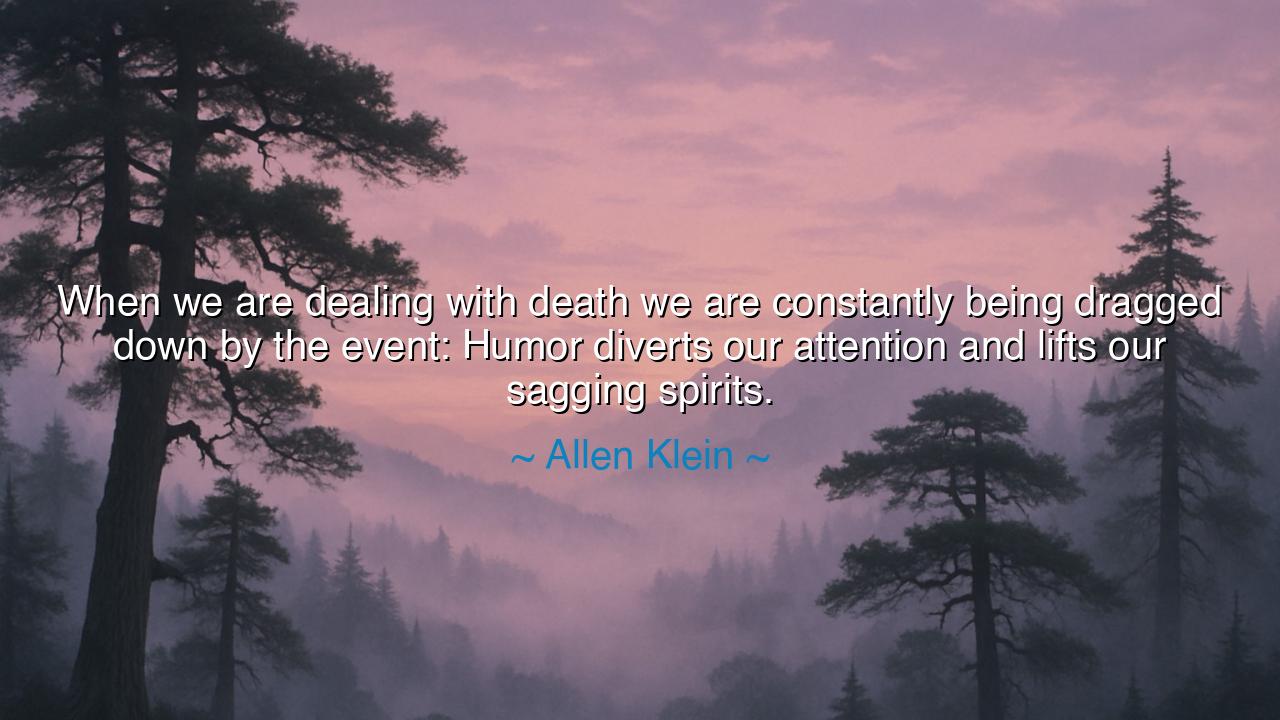
When we are dealing with death we are constantly being dragged
When we are dealing with death we are constantly being dragged down by the event: Humor diverts our attention and lifts our sagging spirits.






The writer and “Jollytologist” Allen Klein, a man who devoted his life to understanding the healing power of laughter, once said: “When we are dealing with death we are constantly being dragged down by the event: Humor diverts our attention and lifts our sagging spirits.” In these words lies a truth as ancient as sorrow itself — that humor is not the denial of grief, but its companion, its healer, its quiet redeemer. Death, the great shadow that haunts every living soul, pulls the heart downward into despair. Yet within the same heart dwells laughter — the spark that defies the darkness, the reminder that even amid endings, life still breathes. Klein, who turned his own pain into wisdom, teaches that humor does not erase loss, but rather gives the soul strength to bear it.
To be “dragged down by the event” is to feel the natural gravity of grief. When death enters our lives — whether through the loss of a loved one or the confrontation with our own mortality — the world seems to collapse inward. Time slows, light fades, and joy feels like a betrayal. Yet, Klein reminds us, laughter is not betrayal — it is survival. Humor diverts our attention, not in forgetfulness, but in mercy. It allows the heart a brief rest from pain, a moment’s breath amid suffocation. In this, humor becomes not frivolous, but sacred — a bridge between sorrow and acceptance, between despair and the first fragile smile of hope.
The ancients knew this paradox well. When Socrates was condemned to death, his final hours were not marked by wailing, but by laughter. He joked gently with his followers about the manner of his burial and teased them for their tears. His humor was not mockery, but serenity — a final act of wisdom. By meeting death with wit, he showed that even in the face of annihilation, the human spirit can remain undefeated. His laughter did not deny death’s power, but transcended it. So too does Klein’s message echo through time: laughter in the face of death is not weakness — it is courage disguised as joy.
And consider also the ancient Irish wakes, where mourners, gathered in grief, told stories of the departed filled not only with tears but with laughter. In the sharing of memory — the foolish acts, the mischief, the moments of light — they celebrated not the absence of the dead, but the fullness of their life. The laughter became a form of prayer, a way of affirming that love outlasts the grave. In this ancient ritual we see the truth of Klein’s wisdom: that humor lifts the sagging spirit not by dismissing sorrow, but by reminding us that grief itself is born from love — and love, being eternal, must also laugh.
To find humor in death is not to mock the sacred, but to honor it. Death is inevitable, but despair is not. Humor allows us to reclaim our humanity in the midst of loss. It is the torch that lights the path through mourning, revealing that the end is not void but transformation. Allen Klein himself came to this understanding after the death of his wife, when he saw how laughter eased even the heaviest hearts. His mission became one of compassion — to teach others that grief and humor are not opposites but partners in the dance of healing. From his pain came the wisdom that laughter, when born of love, sanctifies sorrow.
The lesson, then, is this: do not fear to laugh when life breaks your heart. When tears flow, let them mingle with smiles. Humor does not dishonor the dead — it honors the life they lived, and the life that continues within you. To laugh amid mourning is to say, “You mattered. You gave joy, and that joy remains.” When grief becomes too heavy, let humor lift you for a moment, as a bird lifts from the ground — not to escape the earth, but to see it more clearly from above.
So, children of grief and light, remember this ancient truth: laughter is a form of resurrection. It does not deny death, but it defies despair. Let your humor be gentle, born of love and memory, and let it remind you that the human spirit cannot be buried. For as long as we can laugh — even through our tears — we remain alive in the truest sense. In that laughter, the dead are remembered, the living are restored, and sorrow is transfigured into strength. Thus speaks Allen Klein’s timeless wisdom: humor is not escape from death, but the triumph of life within it.






AAdministratorAdministrator
Welcome, honored guests. Please leave a comment, we will respond soon